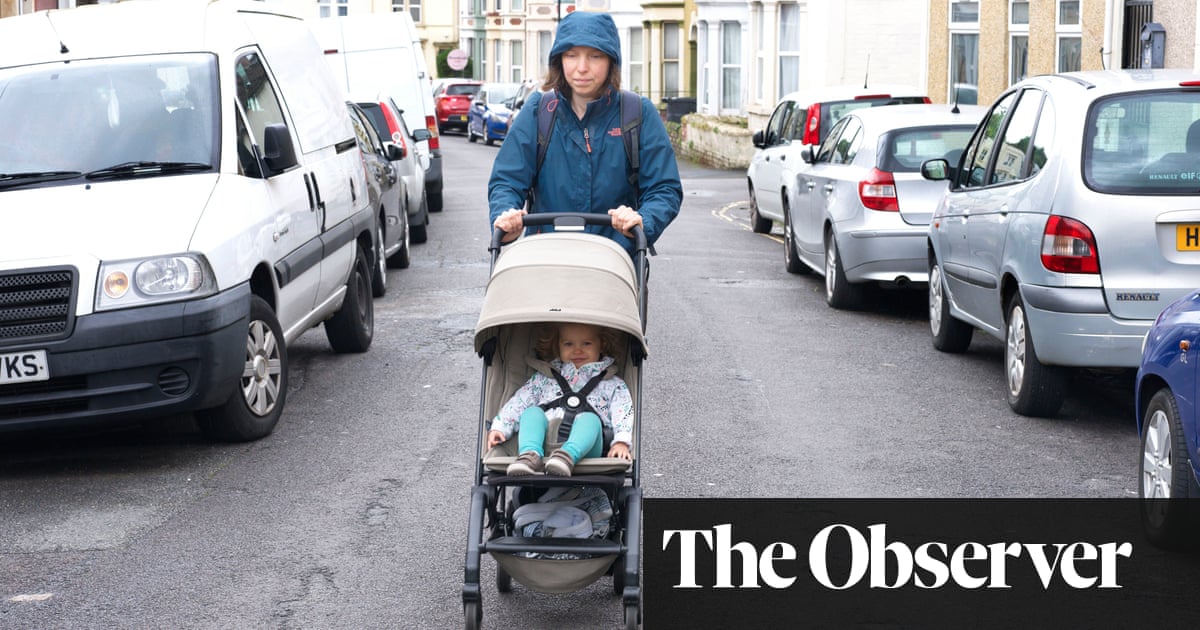
Ismail Mohammad pushes a buggy down the centre of a narrow road in east Bristol. His two sons stay close as vehicles could come from either direction at any moment. “There are cars [parked] on the pavement. We have to go on the road,” says Mohammad as he hurries to the boys’ primary school in Easton. “It’s dangerous because cars sometimes come fast through here.”
This is the daily gauntlet run by parents of young children and by disabled people in many parts of the inner city, where tightly packed Victorian streets struggle to accommodate lines of parked cars, camper vans and ever-expanding SUVs.
If Bristol council has its way, the days of parking on the pavement may be over. In opposition, the Green party called for it to be banned – now they lead the council, they have set up a taskforce to make it a reality.
It is – as Rob Bryher, the councillor leading the group, admits – “incredibly controversial”, but insists it is the only way to get people to walk and cycle, or use public transport, instead of driving, which accounts for half of all journeys in Bristol. Plans include a dramatic increase in double yellow lines and a target to replace at least one on-street parking spot on each of Bristol’s 1,500 streets with a bike hangar, planter or benches every year. Bryher said it “would be a way of gradually but consistently bringing in a different way of seeing urban space”.
The council is exploring new residents’ parking schemes, where drivers pay for a yearly permit, to generate funds for enforcement and new bus routes. There may also be a workplace parking levy on businesses, raising money for public transport improvements. Nottingham brought in a similar scheme in 2012, which collects about £9m a year.
Bryher has little sympathy for drivers who claim they must park on pavements on narrow roads. “You need to park somewhere else instead … there are enough [spaces] for everyone to park in the city,” he says. “It’s just that you might have to park further away and you might have to consider whether you need a car.”
There have long been complaints about Bristol’s public transport. It has some of the UK’s most heavily congested roads but bus usage is below other metropolitan areas.
If Bristol goes ahead, it will be the first city in England outside London to introduce an effective city-wide ban. London councils have been able to issue fines since the 1970s, but in other English cities, only the police can act against motorists caught driving on the pavement or parking dangerously.
In Easton, Mohammad is keen on the council acting. His family, like just over a quarter of the city’s households, doesn’t own a car. But he suspects there will be a backlash from drivers: “They want to park outside their houses. They will fight the council.”
Other parents also back a tougher approach. Denisa Necilova, 32, has just dropped her two sons off at school. “Pavement parking is a big problem here. Sometimes mums with pushchairs like me cannot get through,” she says, pushing her youngest son in a buggy. “I have to go on the roads. It is very dangerous.”
after newsletter promotion
Disability organisations in Bristol argue that pavement parking is limiting the freedom of disabled people – and could one day result in a fatality. “My fear is someday a disabled person will be killed because of a vehicle parked on the pavement,” says Alun Davies, the interim director of the Bristol Disability Equality Forum. “Surely that risk to life and limb trumps the two minutes somebody has to park on the pavement, to get into a shop or something?”
People parked on the pavement on nearby roads feel they have little choice. Rob Poole, 36, is fixing his VW camper van, which is up on the pavement. “If cars are parked on the road it becomes inconveniently narrow,” he says. He understands concerns about accessibility but wouldn’t want to give his vehicle up because it lets him “go places I would otherwise not go because public transport is so poor to certain places.”
James Stockhausen, 34, pauses after helping his family into their car, parked on the kerb outside their house. “The road is not wide enough. If we were fully on the road and [the car on the other side] was fully on the road then no cars could get through,” he says. “There is nowhere else to park in Easton. It is not reasonable [to tell us to park elsewhere]. It is not the answer.”